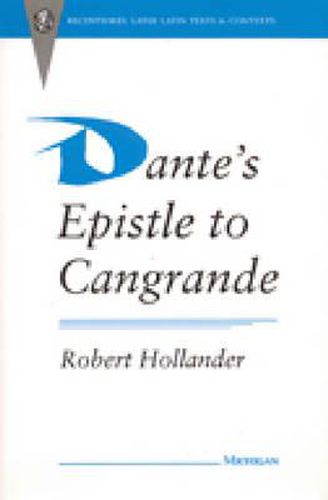Readings Newsletter
Become a Readings Member to make your shopping experience even easier.
Sign in or sign up for free!
You’re not far away from qualifying for FREE standard shipping within Australia
You’ve qualified for FREE standard shipping within Australia
The cart is loading…






Dante’s epistle to Can Grande de la Scala seemingly provides keys to the Divine Comedy; hence it has posed awkward problems for many students of the poet. On one hand, those who discount authorial intention are confronted with Dante’s own reading of his poem, an apparently explicit statement of his intentions. On the other, the epistle offers information on how to interpret the poem’s allegorical elements, which are at odds with modern sensibilities. In Dante’s Epistle to Cangrande Robert Hollander commandingly marshals new evidence to demonstrate that the epistle should be considered authentically Dantean. He further provides enlightening discussion of the nature of tragedy and comedy in the Divine Comedy. The author draws authoritatively on the extensive array of medieval and modern commentaries stored in electronic form by the Dartmouth Dante Project, of which he is the director.
Dante’s Epistle to Cangrande makes a signal contribution to Dante studies. Naturally of interest to students of Dante’s work, it will also be important reading for those concerned with literary critical questions such as authorial intent, programmatic statements, and allegorical interpretations of literature.
$9.00 standard shipping within Australia
FREE standard shipping within Australia for orders over $100.00
Express & International shipping calculated at checkout
Dante’s epistle to Can Grande de la Scala seemingly provides keys to the Divine Comedy; hence it has posed awkward problems for many students of the poet. On one hand, those who discount authorial intention are confronted with Dante’s own reading of his poem, an apparently explicit statement of his intentions. On the other, the epistle offers information on how to interpret the poem’s allegorical elements, which are at odds with modern sensibilities. In Dante’s Epistle to Cangrande Robert Hollander commandingly marshals new evidence to demonstrate that the epistle should be considered authentically Dantean. He further provides enlightening discussion of the nature of tragedy and comedy in the Divine Comedy. The author draws authoritatively on the extensive array of medieval and modern commentaries stored in electronic form by the Dartmouth Dante Project, of which he is the director.
Dante’s Epistle to Cangrande makes a signal contribution to Dante studies. Naturally of interest to students of Dante’s work, it will also be important reading for those concerned with literary critical questions such as authorial intent, programmatic statements, and allegorical interpretations of literature.